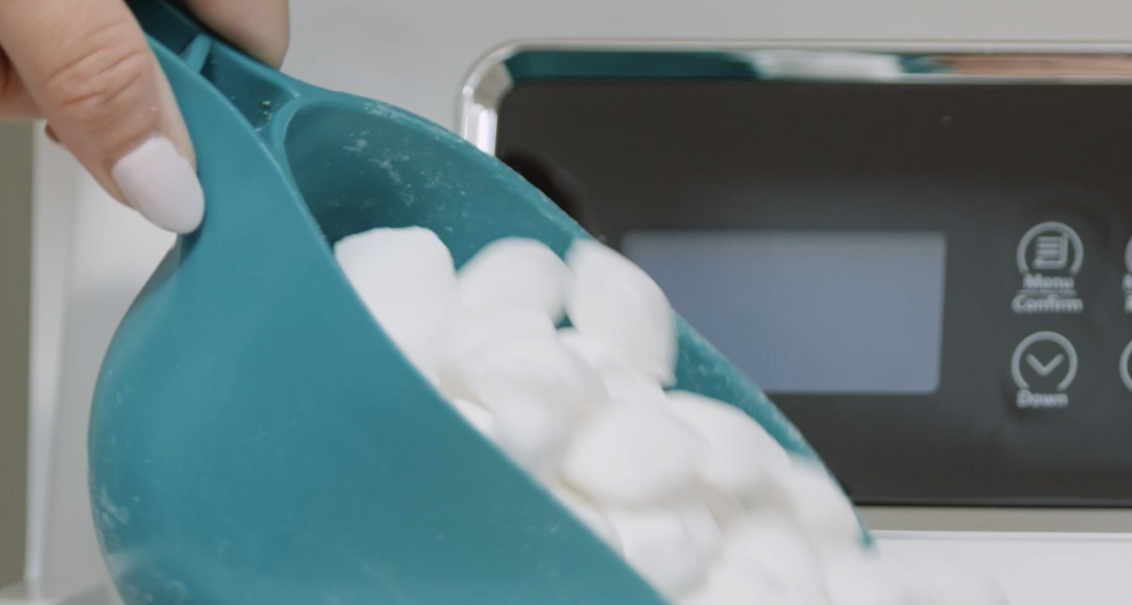Warning – Using Inferior Solar Salt can be a Water Softener Spoiler
Short story | Full story | Conclusion
-
People often choose solar salt for their water softeners because it is less expensive and is flouted as being water softener suitable
-
It’s known to contain impurities which can impair water softener performance
-
Solar salt is particularly unsuitable for use in very hard water areas like the south-east
-
Using solar salt may invalidate your water softener warranty
-
Scott Jenkins Water Softeners stock salt which is manufacturer recommended, that will optimise the performance of your water softener
-
Our salt deliveries are made FREE OF CHARGE
There is a growing tendency for people to use solar salt in their water softeners. It’s understandable, because solar salt is less expensive than conventional water softener salt and its producers describe it as being suitable for water softeners. But this is very misleading, in our opinion.
Solar salt isn’t really pure enough for water softeners – it’s residue can clog up the working parts. This is especially the case in hard water areas, like the south- east. We are regularly being called out to deal with water softeners that are not working properly – and, more often than not, it’s solar salt which has caused the breakdown.
The key takeaway here is that it is not advisable to use solar salt with very hard water, commonplace throughout much of Sussex, Hampshire, Surrey, Kent, Dorset and London.
Using solar salt may also affect your manufacturer’ warranty.
Meanwhile, our salt is tried and tested and is ideally suited to water softeners that need to deal with the hardest water. What’s more, we now deliver salt free of charge.

The full story
The type of salt you use to run your water softener can make a BIG difference in its performance.
We know that quite a lot of people choose solar salt but this appears to be causing a number of technical problems. It’s understandable why people buy it. Firstly, because it’s less expensive and secondly because it says on the packaging that it is suitable to use in water softeners. So, we completely get why people buy it. But, as we shall now explain, solar salt is definitely not healthy for your water softener and should be avoided at all costs.
Imported from Turkey, solar salt comprises high purity salt crystals, made from evaporating seawater or brine, which dries under the region’s burning hot sun. There’s nothing wrong with solar salt in itself – but it does have serious limitations when it’s used as water softener salt.
What is the problem with using solar salt in water softeners?
Although it’s over 99% pure, it still contains enough impurities to clog up your water softener. By that, we mean miniscule amounts of sand and mud. Over time, these tiny quantities can collect in the bottom of the water softener, gradually increasing in volume and density. The offending items can get sucked up into the softener, causing problems to the working parts and even resulting in leakage.
This is a process that might not happen straightaway – it could occur over a number of years – depending on the amount of usage the softener is subject to. But we see it all too often when customers report technical problems with their softeners. Invariably, it comes down to solar salt putting a proverbial spanner in the works.
Very hard water areas, like the South-East, are not suitable for solar salt
It’s one thing to use solar salt in your water softener, in a moderately hard water area – you might well get away with it. But it is not at all suitable for areas like the south-east of England (East and West Sussex, Surrey, Hampshire, Dorset, Surrey, Kent and London) where the water is largely very hard, or exceptionally hard.
The reason why solar salt can be counter-productive is that as pure as it is, it still has lower purity levels compared to other types of salt. This means it is less effective and efficient at softening the water. It has difficulty dealing with softening the hardest water. That’s why you can experience sediment build-up in the brine tank.
Solar salt is around 99.6% pure compared to evaporated salt which has 99.9-100% purity. That small percentage can make all the difference.
Will solar salt affect my water softener warranty?
You may find that using solar salt could invalidate your water softener warranty. So, to avoid any confusion or issues down the line, it’s recommended that you stick to the manufacturer recommended salt that we stock. The salt we use is mined in Cheshire or imported from Germany and is virtually 100% pure.
We don’t charge to deliver salt
The good news is that Scott Jenkins Water Softeners no longer charge for delivering salt.
Conclusion
Although solar salt is used in water softeners, it can be counter-productive to use in very hard water areas, like the south-east of England.
The impurities it contains, like sand and mud, can find their way into the working parts of the softener, which can downgrade the performance or, in the worst case, can stop the softener working altogether.
Using solar salt may also invalidate your water softener warranty. For these reasons, it’s best to stick to the manufacturer-recommended products – or salts that are proven to work effectively in very hard water areas. It may cost a little more – but it will certainly keep your water softener in excellent working order for much longer.
If you have any concerns about the type of salt you are using in your water softener, contact us immediately. Scott Jenkins Water Softeners are one of the leading water softener companies in the south of England, covering West and East Sussex, Surrey, Hampshire, Dorset and London. For all installation and maintenance enquiries about water softener products, filters and accessories (including salt), contact SJ Water Softeners on 01243 607494 or email: scott@sjbs.info










